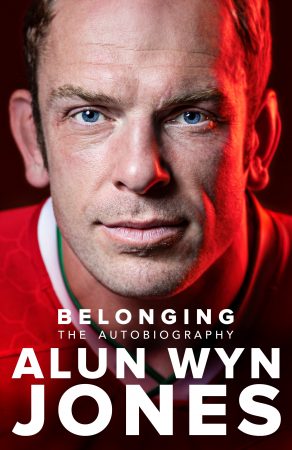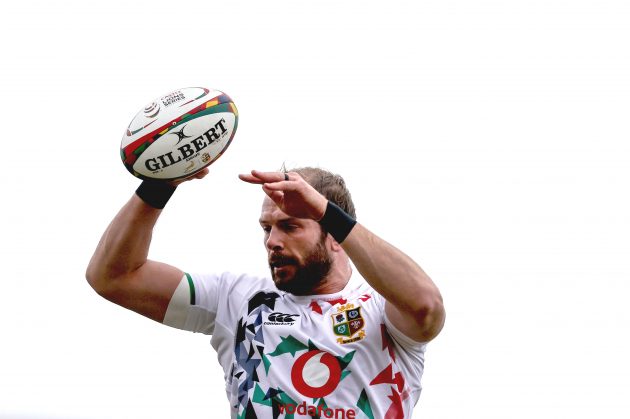The Wales captain's autobiography offers telling insights into the character of a man whose feats in the sport are unprecedented. Rugby World takes a look at Belonging
Alun Wyn Jones autobiography
You don’t have to work within the sport to grasp Alun Wyn Jones’s reluctance to engage with the media. You see it in every televised interview. It’s one reason why his autobiography, Belonging, was always going to intrigue. How much would he open up?
“I’ve got ‘grumpy bastard’ in the locker,” the Wales and Lions captain admits in the book, published by Macmillan. “Some people think I’m arrogant. Some people might think I’m ignorant, when I don’t say much. I’m just quiet. I’m not naturally gregarious.
“You don’t like me? Fine. You make up your own mind. I’d rather be perceived the wrong way than have to pretend to be something I’m not.”

Ghostwriters don’t come better than Tom Fordyce, who worked on Ben Ryan’s award-winning book. The former BBC man has circumvented a shortage of revelatory material by getting to the psyche of AWJ – it’s as if he has set up residence inside the second-row’s head. The style is staccato and punchy.
Thus, even if you’ve read a thousand autobiographies you probably haven’t read anything quite like Belonging. And if you thought you knew AWJ then the book proves you didn’t.
At its heart, again and again, we get to understand the mindset of the world’s most-capped player, one of the all-time greats, yet someone who still pinches himself that he’s sitting on the same bus as Neil Jenkins. Or who struggles to believe that Francois Pienaar would recognise him at a dinner, let alone wander across to his table to say hello.
Someone who never takes selection for granted, so much so that he views the eve-of-Test meal as the Last Supper because it might never happen again.

Winning lineout ball for Ospreys in a United Rugby Championship match against Cell C Sharks (Inpho)
He has a healthy disregard for ‘culture’ – all you need to know is be honest with each other, treat people well, live your values, he says – and if anything shuns the spotlight even more when adulation comes his way.
He felt the reaction to him giving his jacket to the freezing-cold mascot at the Wales-Ireland Grand Slam game was over the top. And his face burned with embarrassment when, a week after that 2019 Slam, he and wife Anwen received a standing ovation from fellow diners when they popped out for a meal in Mumbles.
“I was both absolutely mortified and as proud as I’ve been of anything in my rugby career. I wanted the ground to open up,” he says.
Alun Wyn Jones’s journey started amidst the sea views and rocky headlands of Mumbles, where he lived with his father Tim, a solicitor, mum Ann, a history teacher, and older sister Lowri. He played in goal for Mumbles Rangers, sailed boats (he sunk one), flew kites on the beach, played guitar and drums.
Always big for his age, rugby suited him down to the ground and it wasn’t long before he thought wistfully of emulating the likes of Ieuan Evans and Scott Quinnell, whose posters he had up in his bedroom.
His granddad and dad had played for Swansea – Tim was the understudy to legendary No 8 Mervyn Davies – but AWJ’s launchpad to stardom was Bonymaen RFC, at the top of the hill, cold and exposed even when it was tropical down on the beach. He joined at 11, a “happy accident” because the Mumbles club didn’t have the numbers for a team in his age group.
His appetite for work, his hunger for improvement, was evident from a young age. There was one occasion when he didn’t want to train but he can be forgiven that – it transpired that he had septicaemia and was rushed into intensive care.
At Ospreys he would bug Lyn Jones on Monday mornings for a one-to-one review of his performance at the weekend. The coach gave him the nickname Wyn Togs, which became Gwyn Togs, a nod to the white Mizuno boots he wore at the time.

Foul play! Manhandled by Fiji at RWC 2007 (AFP/Getty)
At 18, AWJ was 110kg but with the muscle and power of a soup sandwich. As we know, he became a colossus: 148 Wales caps (and counting), 12 Lions caps, four World Cups, multiple Six Nations titles and Grand Slams.
He’s lived the equivalent of three years in Test-match weeks, he’s played nearly 20% of Wales’ games ever. He’s made 23 consecutive starts against England yet there is no rabid satisfaction in beating the auld enemy, he doesn’t get swept up in any racist nonsense. “I don’t hate the English. I don’t obsess over England. I want to beat anyone,” he says.
Interestingly, it was an incident against England that encouraged him to close off the media. In 2010, he was sin-binned for tripping Dylan Hartley and Wales conceded 17 points while he was off the field. Afterwards, he was repeatedly asked if public criticism of him by Warren Gatland had caused a rift between him and his head coach. There was no rift, of course. “I had nothing to complain about. It was an honest appraisal of what I’d done.”
He offers sharp analysis of colleagues he has worked with – Shaun Edwards, Gavin Henson, Fox Davies, Leigh Halfpenny – and there is recognition that he can improve as both as a father and a husband. The latter especially, if his love notes are anything to go by!
He doesn’t intend to coach because he doesn’t want to be an absent dad, as his own late father was when busy working all hours in his office. Incidentally, Tim represented Mike Ruddock in his legal action against the WRU – fortunately nobody held it against Alun Wyn!

With daughters Mali and Efa after his final World Cup appearance – presumably! – v New Zealand (Getty)
In 2012, AWJ defied medical opinion when returning from a broken toe in a fraction of the time predicted. Nine years on, his return from a dislocated shoulder to play in the Lions series was truly astonishing. It’s doubtful that anyone else would have contemplated such a rapid comeback, let alone achieved it.
The most optimistic prognosis after the mishap against Japan was a three-month absence post surgery. Instead, he drew hope from a consultant’s view that the injury could be rehabbed and set about installing altitude equipment and a hyperbaric chamber at his house.
Throughout the daily physio, then training at Ospreys, then collision work with Wales players ten days on from the scans, he refused to take painkillers so he knew where he was at. When he got the all-clear to fly out to South Africa to join his Lions team-mates, he barely left his aeroplane seat to reduce the risk of contracting Covid.
21 – Alun Wyn Jones has come on as a replacement for the @lionsofficial, exactly three weeks after suffering a dislocated shoulder against Japan; it is just the eighth time he’s come off the bench for the Lions in what was his 22nd appearance. Indestructible. pic.twitter.com/niGdQFNs5N
— OptaJonny (@OptaJonny) July 17, 2021
It’s a great pity that such courage and endeavour wasn’t rewarded in the form of a series victory. So, too, the fact that Wales have fallen agonisingly short in two of his World Cups, beaten by slender margins in semi-finals that might easily have been won.
Alun Wyn Jones isn’t after sympathy, however. He brushes off the pain and moves on to the next match, the next tournament, the next assignment. At 36 and with so many miles on the clock, you wonder how much longer the journey has to run.
“When I play my last game, part of me will die,” he says. You don’t doubt him for a minute.
Belonging by Alun Wyn Jones is published by Macmillan, RRP £20.
Download the digital edition of Rugby World straight to your tablet or subscribe to the print edition to get the magazine delivered to your door.





